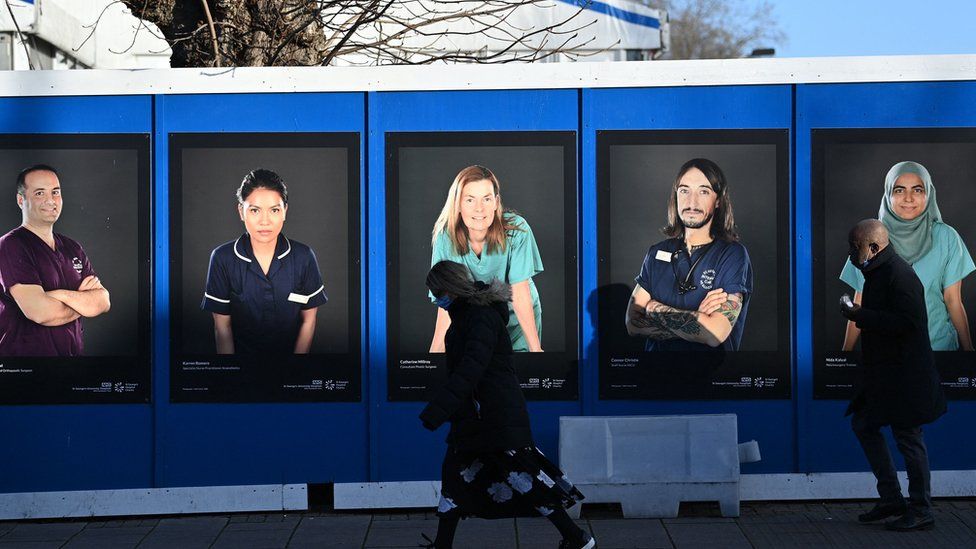ARTICLE AD BOX
 Image source, Getty Images
Image source, Getty Images
By Nick Triggle
Health correspondent
Student loans in England should be written off for certain health staff once they have completed 10 years of NHS service, experts say.
The Nuffield Trust said the financial incentive was needed to stop a "dropout" crisis among nurses, midwives and other front-line staff.
It warned huge numbers were failing to finish training, or leave the NHS soon after starting.
But ministers rejected the idea, saying support was already in place.
The report by the Nuffield Trust is the most comprehensive look at what is happening to those who start training and begin their careers in the NHS.
It looked at a host of different groups from doctors and nurses to midwives and allied health professionals, including physios, occupational therapists and radiographers, who carry out scans.
This data is not routinely published.
But after analysing student records and employment trends, the Nuffield Trust found about one in eight trainee nurses, radiographers and occupational therapists failed to finish their training.
Those who did make it through training did not always go on to work in the NHS, and for those who did, close to one in five nurses, physios and occupational therapists left NHS employment within two years of starting.
The Nuffield Trust said some of those leaving NHS employment could still be working in public sector roles for charities and private firms.
But it said it was still clear there was a worrying trend that could undermine efforts to boost the domestic supply of NHS staff.
Currently the NHS is heavily reliant on recruitment from abroad, but during the summer the government set out a 15-year workforce plan to increase the number of health staff being trained.
The Nuffield Trust said dropout rates were not such a problem for those studying to be a doctor, but there were worrying signs that doctors were taking a break during the early years and not always returning.
It said the student loan forgiveness scheme could work on a sliding scale - so three years of service reduced it by 30%, seven years by 70% and 10 completely.
It only recommended applying it to nurses, midwives and allied health professionals such as physios.
It said for doctors, a way of delaying paying off the loan without accruing interest could be more appropriate.
It costs nearly £65,000 to train a typical nurse - but even if the full loan is repaid in future decades, it still does not cover the whole amount.
'Short-sighted'
Nuffield Trust senior fellow Billy Palmer said: "These high dropout rates are in nobody's interest - they're wasteful for the taxpayer, often distressing for these students and staff who leave, and erode the NHS's ability to deliver safe and high-quality care.
"Simply ploughing more staff into training without thinking about why they leave or what might tempt them to stay is enormously short-sighted."
But he said the loan forgiveness idea would not be a silver bullet, and would need to be accompanied by other measures such as better salaries in the early years of a health worker's career, along with more support when they start.
Even in Scotland, where tuition fees are not charged for Scottish students, or in Wales, where tuition fees are covered if nurses and other front-line staff work for the NHS for two years, problems still exist.
Dean Rogers, of the Society of Radiographers, which is currently involved in strike action, said he welcomed the suggestion.
He said people were being put off training and staying in the profession because of the low starting salary of below £30,000.
"Even after graduating and working as a radiographer for several years, our members talk about not being able to afford to move out of their parents' home.
"This not only puts people off joining radiography courses, but is also likely to discourage people from staying in the profession once they start."
But a spokesman for the Department of Health and Social Care said: "The current student finance system strikes the right balance between the interests of students and of taxpayers. We are working closely with NHS England to reduce student attrition rates and ensure they are supported whilst in training.
"This includes a training grant for eligible nursing, midwifery and allied health profession students of at least £5,000 a year, alongside support for childcare and certain expenses."

 1 year ago
37
1 year ago
37








 English (US) ·
English (US) ·